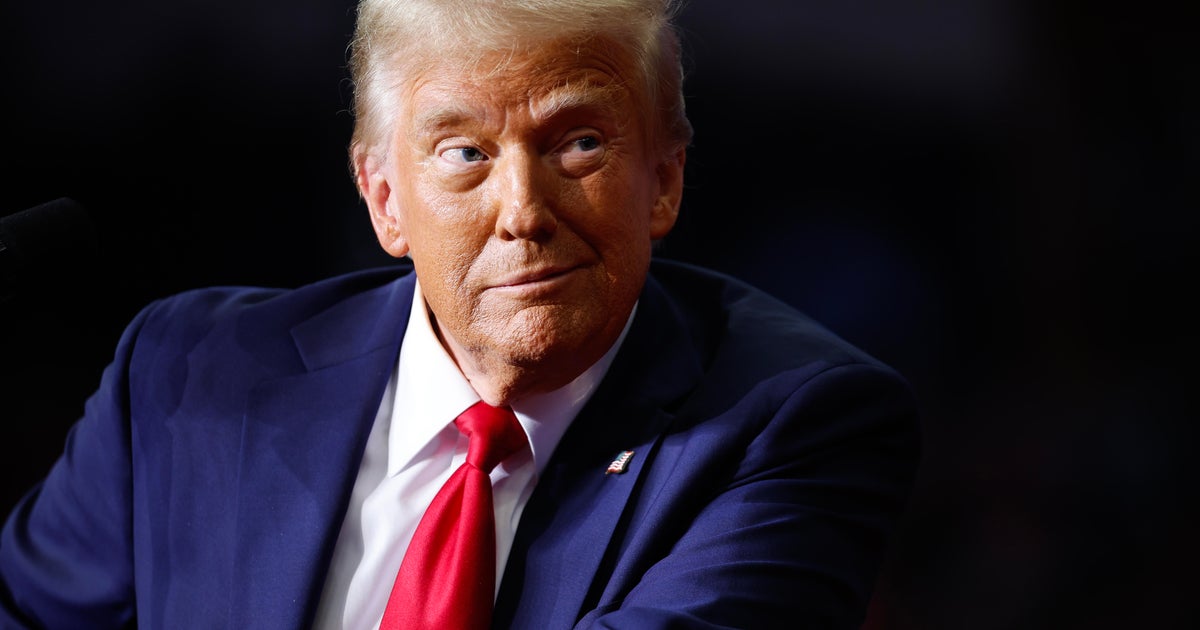CBS News
What we know after 43 monkeys escaped a South Carolina research facility

More than 40 monkeys escaped from a research facility in South Carolina on Wednesday, prompting warnings for nearby residents to secure their doors and windows. The fugitive monkeys had not been captured as of Friday morning.
Here is what we know so far:
Where exactly did the monkeys escape in South Carolina?
The primates broke loose from Alpha Genesis in Yemassee, Beaufort County in South Carolina.
The company confirmed 43 rhesus macaque primates escaped from an enclosure at one of the company’s facilities.
The Yemassee Police Department said on Thursday that traps with bait were set up and thermal imaging cameras were being used in an effort to capture the monkeys.
“Residents are strongly advised to keep doors and windows secured to prevent these animals from entering homes,” police said. “If you spot any of the escaped animals, please contact 911 immediately and refrain from approaching them.”
How did the monkeys escape the research facility?
Greg Westergaard, CEO of Alpha Genesis, told CBS News on Thursday that a caretaker inadvertently failed to secure a door at the enclosure, allowing the monkeys to roam free.
“It’s really like follow-the-leader. You see one go and the others go,” he said. “It was a group of 50 and 7 stayed behind and 43 bolted out the door.”
He told CBS News on Friday that while they have not captured any of the monkeys, they are staying close to the facility.
“They’re just being goofy monkeys jumping back and forth playing with each other,” he said. “It’s kind of like a playground situation here.”
Westergaard said the company has put out baited traps but the monkeys are not going inside them yet.
“They’re jumping down and taking the food and then jumping back up on the fence and the tree line,” he added. “They’re watching us the same way we’re watching them.”
He acknowledged that it would be a long process to get them back and that they didn’t want to chase the monkeys because that would spook them and make them run away.
“We’ve got them very close,” Westergaard said. “This is all like what we want to see.”
What kind of monkeys are they?
The monkeys that escaped are rhesus macaque primates, which have brown fur with red faces and ears. They have close-cropped hair on their heads, which accentuates their very expressive faces.
The rhesus macaques are Asian, Old World monkeys that are primarily found in Afghanistan, Pakistan, India, Southeast Asia and China.
Md Rafayat Haque Khan/ Eyepix Group/Future Publishing via Getty Images
Rhesus macaques were imported to the U.S. in the 1970s for biomedical research in laboratories, according to the New England Primate Conservancy.
Rhesus macaques are “bold, extremely curious, and adventurous monkeys” and the species is “highly adaptable to coexisting alongside humans,” the conservancy says.
The rhesus macaque’s typical diet includes roots, fruit, seeds, and bark as well as insects and small animals.
What were they using the monkeys to test?
According to its website, Alpha Gensis breeds monkeys and provides “nonhuman primate products and bio-research services” across the globe. The company’s clinical trials reportedly include research on progressive brain disorders.
Local authorities said Thursday that the escaped primates were “very young females weighing approximately 6-7 lbs” and had never been used for testing due to their age.
Alpha Genesis says its staff of veterinary technicians and animal specialists work with cynomolgous, rhesus and capuchin monkeys.
The Post and Courier newspaper reported last year that Alpha Genesis won a federal contract to oversee a colony of 3,500 rhesus monkeys on South Carolina’s Morgan Island, known as “Monkey Island.”
The U.S. Centers for Disease Control and Prevention confirmed in a statement that the monkeys were previously living on Morgan Island as “free-range monkeys” and were brought to the Alpha Genesis facility “for conditioning to be around people.”
The facility is registered with the CDC as a nonhuman primates importer, which means it “must meet standards for the importation, quarantine, and use of NHPs,” the agency said.
The CDC added that “the risk to the public is low as long as people do not approach or come in contact” with the monkeys.
How often do research monkeys escape?
This is not the first time primates have escaped from Alpha Genesis.
Eight years ago, 19 primates escaped from the company’s facility but were recaptured about six hours later.
CBS affiliate WCSC in Charleston at the time reported that local officials said the escapes were not infrequent but generally the monkeys return to the compound because they know that is where there is food.
“Every couple of years we’ll have one or two that get out. We have never had this many get out,” Westergaard told CBS News on Friday.
Last year in Pennsylvania, dozens of lab monkeys escaped after a truck carrying 100 of the animals crashed. All the primates were later accounted for.
CBS News
Qantas plane makes emergency landing in Sydney

Watch CBS News
Be the first to know
Get browser notifications for breaking news, live events, and exclusive reporting.
CBS News
What the Fed rate cut means for HELOC interest rates

Getty Images/iStockphoto
Interest rates are heading down again, according to the Federal Reserve. On Thursday, the Fed issued another cut to its federal funds rate, the second in the last three months. Now at a range between 4.50% and 4.75%, the rate is down 75 basis points from where it was in early September and it could fall further again when the Fed meets for the final time in 2024 on December 17.
While these cuts will reduce what savers can earn with high-yield savings and certificates of deposit accounts (CDs), they will help borrowers who have been contending with higher rates on a variety of loan products. For those who are considering accessing their home equity now, or for those who already have a home equity line of credit (HELOC), this can be particularly advantageous. So what does the new Fed rate cut mean for HELOC interest rates? That’s what we’ll break down below.
See how low of a HELOC interest rate you’d qualify for here.
What the Fed rate cut means for HELOC interest rates
In short: The latest Fed rate cut is good news for HELOC interest rates and for those borrowers who have already decided to access their home equity with the line of credit. That’s because HELOC rates tend to follow the Fed more closely than other products. Mortgage rates, for example, influenced by factors like the 10-year Treasury yield, have not dropped as significantly as home equity loan rates have in recent months. But home equity rates more closely match the path that the federal funds rate takes, so if that’s declining HELOC rates will, too.
This can be seen clearly because HELOC rates change daily and are variable, meaning that the HELOC rate you saw listed on lender websites early this week is likely lower now and could be even lower next week. With an additional cut in December pegged at an almost 65% likelihood by the CME Group’s FedWatch tool, rates on HELOCs could fall further still. And if that likelihood increases based on additional economic considerations, lenders may start pricing in that reduction in advance of it being formally issued.
This is all positive news for both those who have yet to apply for a HELOC and for those who already have one. Since HELOC rates change monthly, current borrowers will likely see reductions in their upcoming payments and, unlike home equity loans, they won’t need to refinance to secure the lower, prevailing rate as HELOCs adjust independently with no action required on behalf of the borrower. For all of these reasons, then, and with the average amount of home equity particularly high currently, right now is a great time to open a HELOC.
What about home equity loan rates?
Home equity loan rates will also fall with this latest Fed cut, but it’s unlikely to be by the same increment the federal funds rate was cut by. Still, home equity loan rates are slightly lower than HELOCs now (8.41% versus the HELOC’s average of 8.70%). And home equity loan rates are fixed, meaning borrowers who take out a loan now won’t have to worry about any future rate volatility. At the same time, they won’t be able to capitalize on any additional rate cuts that are issued, either. So borrowers will need to weigh the risks of waiting versus the low rate they can lock in now to determine which is the best option for their unique financial situation.
The bottom line
A Fed rate cut, even in a small amount, is good news for all types of borrowers, but particularly for those who have or are considering a HELOC. Still, it’s critical to remember that rates on home equity products are lower than most alternatives because the home in question serves as collateral – and you could lose it if you don’t repay all that you’ve withdrawn. So go into the home equity borrowing situation clear-eyed and focused to avoid overborrowing from one of your most critical assets.
Have more HELOC questions? Learn more here now.
CBS News
Donald Trump says he has no plans to sell DJT stock, calls for probe into “market manipulators”

President-elect Donald Trump took to Truth Social on Friday to reiterate that he doesn’t plan to sell shares of Trump Media & Technology Group. He also called for an investigation from “the appropriate authorities” into “market manipulators or short sellers,” whom executives at the company and shareholders have previously blamed for volatility in the stock, which trades under the ticker symbol DJT.
DJT shares jumped shortly after Trump’s post, gaining as much as 16% on Friday. The stock rose $3.15, or 11.4%, to $30.84 in early afternoon trading, partly reversing a 23% plunge on Thursday that had trimmed some of the company’s gains in the run-up to the November 5 election.
Trump, who is the biggest shareholder of Trump Media with a 57% stake, said the business has been the target of “probably illegal rumors and/or statements” that he said allege he plans to sell shares of the company, which owns the Truth Social platform. In September, Trump had vowed not to sell his stake after a lock-up period expired for Trump Media insiders, allowing them to sell for the first time since the stock went public in March.
Trump Media, whose DJT ticker is the same as Trump’s initials, has seen extreme volatility on Nasdaq, with its shares swinging wildly on news related to the president-elect. That has prompted comparisons of DJT with meme stocks, or companies that trade on social media buzz rather than financial fundamentals such as revenue and profit growth.
Trump’s call for an investigation into trading of the stock highlight potential conflicts of interest between his role as the nation’s chief executive and his business interests, with his holdings in the company valued at $3.6 billion as of Friday afternoon. As president, Trump will not only have oversight of many federal agencies, but will also appoint the head of the U.S. Securities and Exchange Commission, the agency that regulates the securities industry.
Although there’s no requirement that presidents sell their financial assets when they take office, most U.S. presidents have opted to put their business holdings into a blind trust, according to the Brennan Center for Justice, a nonpartisan law and policy institute.
A blind trust is managed by an independent trustee, and the president or other official who created the trust isn’t allowed to advise or consult with the trustee on business decisions.
During Trump’s first term as president, he chose not to place his company, the Trump Organization, into a blind trust, opting instead to hand over management of the company to his oldest two sons, Donald Jr. and Eric, along with its longtime chief financial officer, Allen Weisselberg. (Weisselberg was released from jail in July after pleading guilty to giving false testimony about the size of Trump’s triplex apartment as part of a civil fraud trial.)
Trump’s arrangement during his first administration was flagged by some ethics experts as problematic, with former chief White House ethics lawyer Norm Eisen writing in 2017 that it failed to resolve the conflicts of interest between Trump’s business holdings and his role as president.
Trump Media stock price chart
Trump Media has attracted short sellers, or investors who seek to make a profit when a stock tumbles. That drew accusations from Trump Media CEO Devin Nunes, a former Republican congressman, that these investors have manipulated the stock. Nunes has requested investigations by lawmakers and the Nasdaq stock market, where DJT is listed.
Because of Trump’s majority ownership of DJT stock, the stock would likely drop if he sold his shares “for any reason,” noted S3 Partners in a November 6 research note.
In his post on Truth Social Friday, Trump said he believes in Trump Media, and refuted claims that he is interested in selling shares.
“THOSE RUMORS OR STATEMENTS ARE FALSE. I HAVE NO INTENTION OF SELLING!” Trump wrote. “I hereby request that the people who have set off these fake rumors or statements, and who may have done so in the past, be immediately investigated by the appropriate authorities.”









